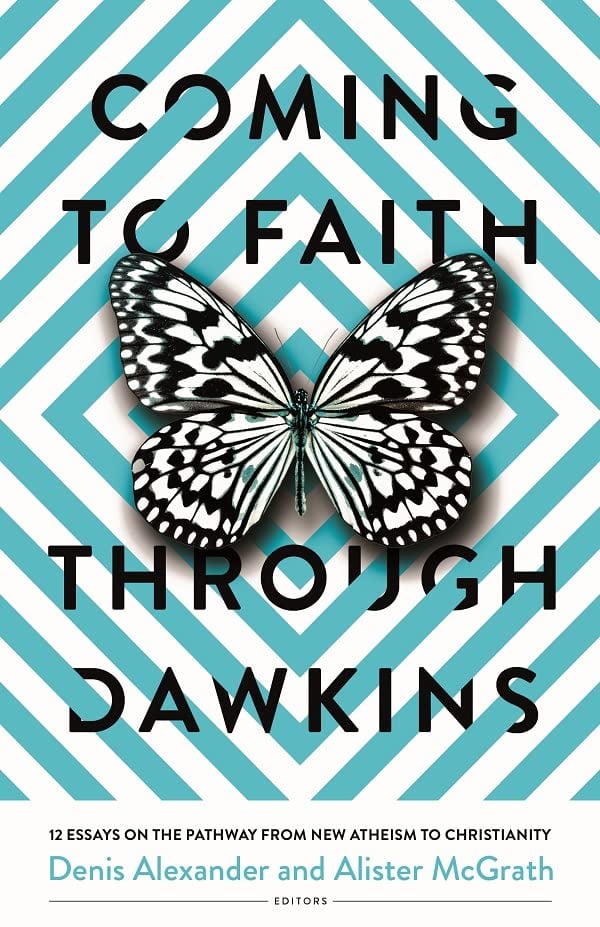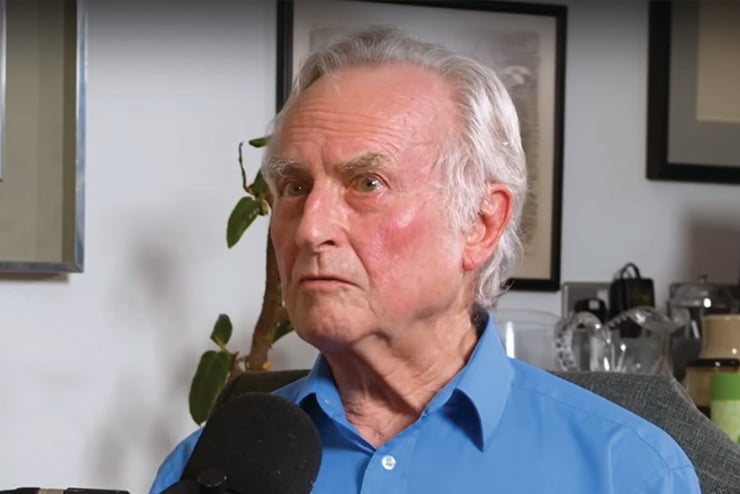Converts to the 2000s’ New Atheism have finally realized how glib and intellectually flimsy its leaders were.

Coming to Faith Through Dawkins: 12 Essays on the Pathway from New Atheism to Christianity
eds. Denis Alexander and Alister McGrath
Kregel Publications
272 pp., $21.99
Richard Dawkins revealed his limited understanding of religious matters in a discussion with the atheist podcaster Alex O’Connor. Dawkins, known as one of the “Four Horsemen” of atheistic evangelism, called the doctrine of original sin “a hideous idea.” Incredibly, he suggested that Jesus never presented himself as a source of spiritual salvation, but only offered a “good life” to his followers.
O’Connor, decades younger than Dawkins but with a degree in theology, politely corrected his mentor on both points. Not only did Jesus clearly offer salvation in the Gospels, but it’s also true that evolutionary theory supports the idea that humans are innately predisposed to some of the behaviors Christians classify as sinful.
“I’m sorry for you having to do a degree in this kind of thing,” Dawkins responded, in the sneering tone of a surly teenager. “It’s not a real subject, is it?”
Dawkins’ profound ignorance and glowering contempt for religious thought are not immediately clear to those who have adopted his atheist dogma. Coming to Faith Through Dawkins provides a dozen accounts of former adherents of the Dawkinsian view who became apostates precisely because they looked closely at that dogma. The book’s 12 contributors are a varied bunch. Sy Garte grew up in an American communist family, while Rafik Samuel was raised as an Egyptian Coptic Christian. There are chapters from an ornithologist, an actor, a biochemist, and a former habitual user of psychedelics. Each, in his or her particular way, describes the journey through materialist atheism to faith.
Dawkins’ 2006 manifesto The God Delusion, which was influential to most of these writers at some point in their lives, is one of the three holy books of the New Atheist movement. The others are Sam Harris’ The End of Faith (2004) and Christopher Hitchens’ God Is Not Great (2007). All three are endlessly praised in atheist circles, though the broader media reception was more complex. Even The New York Times’ review of The God Delusion described it as “smug,” “hasty,” “sloppy,” and “frustrating.”
Perhaps the biggest argumentative hole in Dawkins’ book—and in New Atheism more broadly—is discussed at length in this collection by Sarah Irving-Stonebraker, an Australian historian. Her essay deals with the atheist effort to produce and justify the moral universe Dawkins admits he desires. “Nature is red in tooth and claw,” Dawkins has said, “but I don’t want to live in that world.”
It is, however, not clear that he has an intellectual choice, given that his only guide for ethics is the theory of natural selection. That theory describes all action by living entities, including human beings, as motivated by self-interest. This is true both in the direct sense of preserving oneself and more indirectly through sacrifice for and protection of closely related kin, who share most of one’s genome.
Evolutionary theorists have worked out a framework for understanding some kinds of apparently altruistic behavior via what they call reciprocal altruism or indirect reciprocity. In social systems in which individuals interact repeatedly and often, or in social status systems involving reputations, some seemingly selfless behavior towards individuals who are not close kin is nonetheless ultimately beneficial for oneself, and thus self-interested.
The zoologist Richard Alexander, author of The Biology of Moral Systems (1987), did yeoman’s work to formulate an evolutionary understanding of how such altruism could emerge. As human groups grew in size, opportunities for individual conflict increased, necessitating systematic mechanisms for resolving those conflicts in the interest of group cohesiveness. A reputation system would make people more likely to trust and exchange with others of positive reputation, who would benefit materially.
The invention of gods, in Alexander’s analysis, facilitated the interests of members of one social group against other groups. Early religions were always tribal religions, in which the god represented the tribe. Universalist religions likely emerged as the religions of subjugated peoples in a majority society dominated by ethnic or racial others.
The theory of indirect reciprocity, however, is only feasible in terms of evolutionary theory if individuals benefit from what appears to be selfless action but in fact is not. Are there not examples in which there is no benefit for selfless behavior? Christian injunctions to charity frequently include a call not to seek self-advancement as a result of one’s charity (“Let not thy left hand know what thy right hand doth.”) And even though only a small percentage of charitable giving is anonymous, it is significantly more common among the most generous donors.
Perhaps some of these anonymous donors are simply cautious about revealing their wealth to the public. But others straightforwardly tell us they are motivated by religious beliefs. As Irving-Stonebraker puts it, “care for the marginalized [does] not stem from atheism” and it cannot be fully explained exclusive of religion. She movingly describes how her faith gave her the strength to carry on after the tremendous tragedy of four miscarriages.
Other writers take up the criticism of Dawkins from different directions. Louise Mabille provides profound insights into the cult-movement psychology motivating New Atheism. There is an idealized and heroic personality aura around each of the “Four Horsemen” of the movement (Hitchens, Dawkins, Harris, and the recently deceased Daniel Dennett). Their writings and public appearances are treated as holy writ, completely beyond the possibility of any serious critical engagement.
The New Atheists, like the woke leftist thinkers that they at least sometimes oppose, are practitioners of what Nietzsche referred to as ressentiment. They blame the thing they have set up as their adversary—religion—for virtually all evil in the world. As a result of this obsessive consumption with the purported nature of their opponent, they come to understand themselves as its eternal victims, always under attack, incapable in the end of asserting an independent identity apart from opposition to religion. New Atheism ends up more consumed by religious matters—at least as they conceive such matters—than often are the religious. Dawkins et al. cannot think of anything without immediately imagining how religion spoils it.
The charisma of the New Atheists is discussed by several of the contributors as key to their influence. Rafik Samuel admits that it was especially Hitchens, the movement’s suave, cocksure, sharp-tongued, swashbuckling English rogue, who motivated him to leave the faith of his family and become an atheist. He gradually began to understand the limits of that charisma. He recalls watching Hitchens lose a debate with Christian philosopher William Lane Craig, seeing the latter dispassionately and clearly use rational argument to dispense with Hitchens’ flowery, gauzy allusions. Though he was rooting for Hitchens, he could not fail to see how ineffectively he defended his view of morality in purely materialist terms.
Peter Byrom elaborates on the New Atheists’ inability to handle the most serious debate points from the Christian side. He gives an account of Dawkins’ dismantling in a debate, also with Craig. Craig himself later recalled being startled by the limits of Dawkins’ knowledge. The self-assured but demonstrably vacuous egotism of the New Atheists was on full display, and it was an educational moment for Byrom.
Ashley Lande provides a moving account of her initial infatuation with Hitchens’ ideas and subsequent realization of his incapacity to answer the most serious of life’s questions. She recalls Hitchens, toward the conclusion of God is Not Great, declaring that if God concealed Truth in one hand, and the “steady and diligent drive to the Truth” without any promise of attaining it in the other, he would choose the latter. The assertion that human life must be founded only on the impossibility of certainty and the valorization of eternal doubt rightly appeared an intolerable endpoint for Lande. If we were, as she puts it, “doomed to perpetually strive toward truth without any hope of ever obtaining it,” this would be an unlivable condition. We are not made for such a world. Mere animals can live in it, but our spirits rebel against it.
Some of the contributors to this volume are less than scintillating writers, or perhaps the editors sometimes let them go on too long in excessive detail about unimportant minutiae. The overall gist, though, is profound. Richard Dawkins and his New Atheist colleagues offer glib, intellectually careless, and ungenerous criticisms of Christianity that are superficially convincing for those educated in the general secularism of today’s Western culture. However, a close and critical consideration of New Atheist criticisms can lead one to deeper, truer insights into the spiritual element of human nature.

Leave a Reply